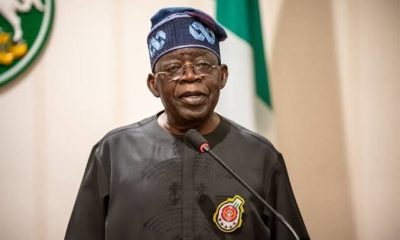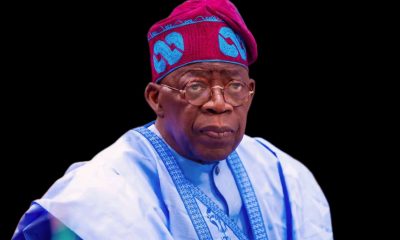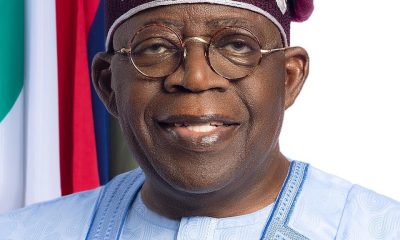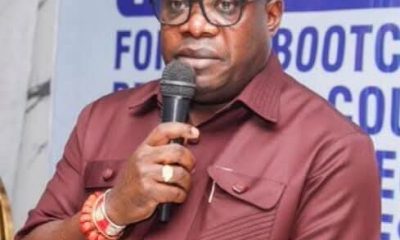/home/iduwiniv/public_html/wp-content/themes/zox-news/parts/post-single.php on line 153
">
Warning: Undefined array key 0 in /home/iduwiniv/public_html/wp-content/themes/zox-news/parts/post-single.php on line 153
Warning: Attempt to read property "cat_name" on null in /home/iduwiniv/public_html/wp-content/themes/zox-news/parts/post-single.php on line 153
READ FULL TEXT OF PRESIDENT TINUBU’S INAUGURAL SPEECH.
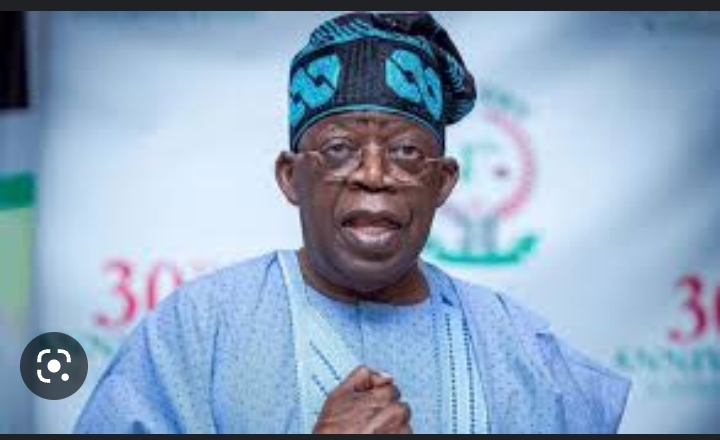
My Fellow Citizens,
I stand before you honoured to assume the sacred mandate you have given me. My love for this nation is abiding. My confidence in its people, unwavering. And my faith in God Almighty, absolute. I know that His hand shall provide the needed moral strength and clarity of purpose in those instances when we seem to have reached the limits of our human capacity.
This day is bold and majestic yet bright and full of spirit, as is our precious nation.
As a nation, we have long ago decided to march beyond the dimness of night into the open day of renewed national hope.
We must now decide whether to stick to the work required to create a better society or to hide in the shadows of our untapped potential. I can think of only one solution. We are too strong a country and too firmly rooted as a people to deprive ourselves of our greatest potential. Millions of people have prayed for this country, and our collective sacrifices have influenced its journey.
We have faced challenges that might have caused other societies to disintegrate. The hope of a brighter future, however, merges with our enhanced ability to shape that future at this SUBLIME moment because we have carried the great load to get there. We have more solidly established this country as a democracy in both word and deed, surprising many but not ourselves
Our political heritage today emphasizes a smooth transition from one government to another. This transfer of power is a representation of our faith in God, our steadfast belief in representative government, and our confidence in our ability to remake this country into the kind of society it was always meant to be. Permit me to now address President Muhammadu Buhari, my predecessor. You have been a trustworthy, patriotic leader who has done your best for the country you adore, Mr. President. You are a deserving friend and partner, to put it more personally. I hope History treats you well.
Critics of Nigeria have been spreading the myth that our country will disintegrate or possibly perish for many years.
However, here we are. We have made mistakes along the way, but our tenacity and diversity have seen us through. Sometimes our burdens may cause us to stoop, but they will not ever cause us to fall. As the most populous country in Africa, the Black Race’s best hope, and its most steadfast defender, we stand out instead. As citizens, we therefore vow that Nigeria shall endure so long as this earth endures, as one unified people committed to one undivided national cause. The torch of human growth is now in our hands as Fate and Destiny come together. We cannot allow it to slip. We raise this flame aloft in order for it to shine on every home and in every heart that claims to be Nigerian. We raise this beam because it illuminates our way with kindness, unity, and peace. May this brilliant light never go out.
Although we will rule on your behalf, we will never be in charge of you. We will talk and consult, but we will never give orders. We will be inclusive of everyone and never disparage someone for possessing opinions that differ from our own. This nation needs to be further repaired and healed, not torn apart and damaged. In keeping with this, allow me to make a few observations about the election that led to this point. It was a competitive battle. Additionally, it was won fairly. Nigeria has not held an election of higher caliber since the establishment of the Fourth Republic. The result reflected the people’s wishes. However, despite winning, I am no more a Nigerian than my rivals. They are not any less patriotic as a result. They will always be considered my fellow citizens. And I shall treat them accordingly. They stand for significant constituencies and issues that wisdom would be foolish to dismiss. They have brought legal action on their behalf. They have the right to seek legal remedies, and I fully support them in exercising this right. The foundation of the rule of law is this.
Our founding ancestors valiantly sacrificed themselves more than 60 years ago to establish Nigeria as an independent country. The work done by those who came before us must never wither, but must instead blossom and give birth to a better world. Let us move forward with the mission they started and believed in. Let us renew our commitment to making Nigeria, regardless of creed, ethnicity, or place of origin, the indispensable home for each and every one of us. Thank you to all of my fans. I reach out across the aisle to folks who cast different ballots. I beg you to understand it in terms of brotherhood and national connection. Political overtones have vanished in my opinion. Nigerians are all I can see. May we sustain these excellent ideas as the new Nigerian standard.
My fellow citizens, The Nigerian ideal I am referring to is more comprehensive than only an increase in economic and other statistics. Although these items are significant, they can never fully communicate our story. Our goal is to make changes to our way of life that foster our humanity, promote kindness toward one another, and appropriately honor our group’s efforts to address the social issues that seek to divide us. We have a nation on paper thanks to our constitution and laws. By deepening the ties of economic cooperation, social solidarity, and cultural understanding, we must work harder to bring these beautiful documents to life. Let us cultivate a spirit of justice and equity among us. The South must recognize that good for the North advances its own interests in addition to seeking good for itself. The South must be seen similarly by the North. You are all my people, whether you come from the twisting creeks of the Niger Delta, the wide northern savannah, the boardrooms of Lagos, the humming capital of Abuja, or the bustling markets of Onitsha. As your president, I will act impartially toward everyone and with compassion for everyone.
My team will make critical details of our initiative public in the days and weeks to come. Today, allow me to briefly describe a few programs that embody our vision of progressive good governance in support of the Nigerian ideal: The simple guiding ideas for our administration are as follows:
1. Nigeria will be impartially administered in accordance with the law and the constitution.
2. We will protect the country from terrorism and all other types of criminal activity that put the peace and stability of both our nation and our area in danger.
3. We will restructure our economy to promote growth and development by generating jobs, ensuring food security, and putting an end to severe poverty.
4. Women and young people will take center stage in our administration.
5. To deter corruption and increase the efficacy and efficiency of the various anti-corruption institutions, our administration will continue to adopt proactive measures such promoting a credit culture. SECURITY Our administration’s main goal must be security because, in an environment of instability and violence, neither prosperity nor justice can triumph. Both our security DOCTRINE and its ARCHITECTURE will need to be changed if we are to effectively combat this threat. In order to enhance our investment in security professionals, we must do more than simply hire additional people. We will offer greater instruction, gear, salary, and firepower
OUR ECONOMY
In terms of the economy, our goals are to drastically lower unemployment and increase GDP growth. The following actions are what we plan to take to achieve this: First, there will be a budgetary reform that stimulates the economy without causing inflation. Second, industrial policy would make use of all available fiscal tools to support domestic manufacturing and reduce reliance on imports. Third, both homes and businesses will be able to obtain and afford electricity. Networks for transmission and distribution should be strengthened, and power generation should nearly double. States will be urged to create local sources as well. I want to let both domestic and foreign investors know that our government would look into all of their grievances regarding excessive taxation and other investment-inhibiting measures.
We will make sure that international corporations and investors return their hard-earned dividends and profits to their native countries. JOBS My administration must provide our youth with worthwhile opportunities. We will keep our promise from the campaign to create a million new employment in the digital sector. Additionally, our government will collaborate with the National Assembly to draft a comprehensive Jobs and Prosperity measure. This legislation would grant our administration the freedom to pursue labor-intensive infrastructure upgrades, support light industry, and enhance social services for the underprivileged, old, and vulnerable. Agriculture Commodity exchange boards must guarantee minimum prices for specific crops and animal products in order to protect rural incomes. There will be a national program for storage and other facilities to cut waste and spoiling.
To boost production and engage in value-added processing, agricultural centers will be established across the country. The livestock industry will be made aware of the best contemporary techniques and the measures taken to lessen the industry’s ongoing disputes over land and water resources. These steps will increase food availability while lowering its price. Farmers would make more money while paying less on average in Nigeria. More on President Tinubu Inaugural Speech INFRASTRUCTURE The Buhari administration’s work on infrastructure will continue. Priority should be given to developments in the national rail, road, and port networks.
FUEL SUBSIDY
We applaud the outgoing administration’s decision to phase out the fuel subsidy system, which has progressively favored the wealthy over the poor. In the context of depleting resources, subsidies can no longer be used to justify their ever-rising prices. Instead, we will reinvest the money in better public infrastructure, healthcare, education, and employment opportunities that will significantly better millions of people’s lives. FINANCIAL POLITICS A comprehensive spring cleaning is required for monetary policy. To achieve a single exchange rate, the Central Bank must work. As a result, money will be diverted from arbitrage into significant investments in the machinery, tools, and employment that drive the actual economy. To promote consumer spending and investment in ways that support the economy at a greater level, interest rates must be decreased. Despite any conceptual virtues, considering the number of unbanked Nigerians, the CBN overly implemented the currency swap. A review of the policy is required. My administration will treat both currencies as legal money in the interim. INTERNAL POLICY
Please allow me to make a few foreign policy thoughts given the world we live in. It is urgently concerning that some countries in our near neighborhood have turned away from democracy and the catastrophe in Sudan. The peace and security of the African continent and the West African subregion must thus be my top priority in terms of foreign policy. To put an end to ongoing crises and prevent new ones, we will collaborate with ECOWAS, the AU, and other willing partners in the international community. We will restructure our foreign policy to more actively lead the regional and continental search for collective prosperity while we contain challenges to peace.
Conclusion
The proudest day of my life is right now. However, I do not own this day. You, the Nigerian people, are the rightful owners. Nigeria proclaims on this day that it belongs among the major democracies of the globe. Nigeria will live there forever. We have arrived at this unique time thanks to the progression of our past and the promise of the future. So that the Nigerian ideal turns into and always stays the Nigerian reality, I want you to work with me to make Nigeria a more ideal country and democracy. Because I am the President of the Federal Republic of Nigeria and I go by the name Bola Ahmed Tinubu, I can confidently state that these things are within our immediate reach. Godspeed, and may He also bless our cherished country.

Warning: Undefined array key 0 in /home/iduwiniv/public_html/wp-content/themes/zox-news/parts/post-single.php on line 493
Warning: Attempt to read property "cat_ID" on null in /home/iduwiniv/public_html/wp-content/themes/zox-news/parts/post-single.php on line 493
News
Ajapa Field MOU: Ogulagha Stakeholders Call for Review, Transparency and Alignment with Current Realities
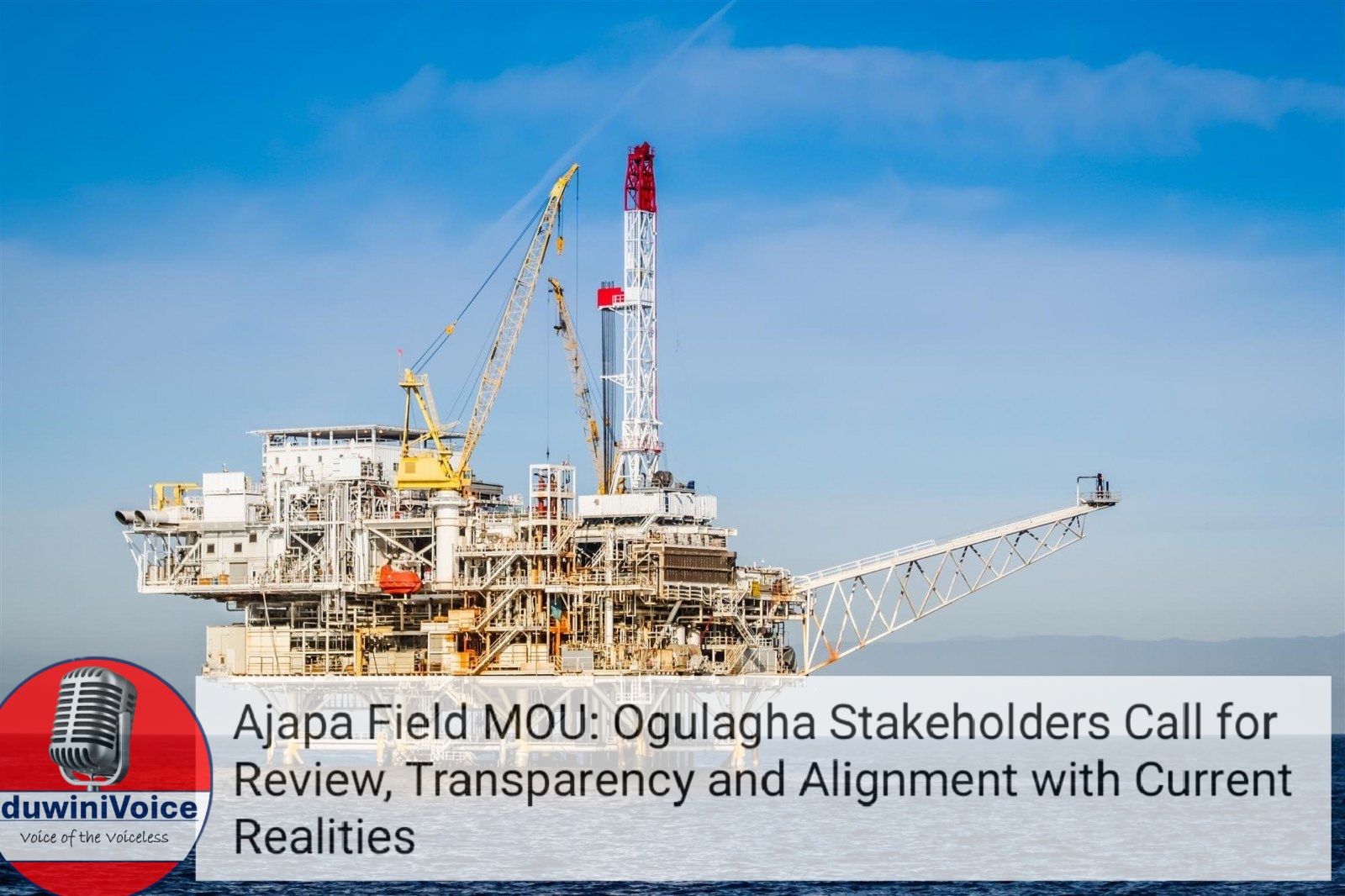
By Charity Ebi
OGULAGHA, DELTA STATE — Nearly two decades after a Memorandum of Understanding (MOU) was signed between Britannia-U Nigeria Limited and Ogulagha Kingdom in Burutu Local Government Area, stakeholders in the oil-bearing community are calling for a comprehensive review of the agreement to reflect present-day economic and industry realities.
The 2007 MOU, tied to operations at the Ajapa Marginal Field, was introduced as a framework for peace, development and mutual benefit. However, community representatives say that while the agreement may have appeared workable at inception, its fixed financial structure has been overtaken by inflation, rising oil revenues and evolving governance standards within Nigeria’s petroleum sector.
Addressing journalists on behalf of stakeholders, Mr. Jude Iyelagha stressed that the concerns being raised should not be misconstrued as an attack on the integrity of Ogulagha’s traditional or political leadership.
“This is not an attempt to indict or insult the credibility of our revered leaders,” Iyelagha clarified. “Rather, it is an encouragement for leaders to revisit the well-documented terms, review them in line with current realities, and ensure they are fully implemented for the benefit of our people.”
Modest Provisions, Expanding Industry
Under the MOU, provisions reportedly included annual allocations for community drugs, scholarships for secondary and tertiary students, training slots at the Petroleum Training Institute (PTI), allowances for trainees, incentives for science teachers and sitting allowances for kingdom committee meetings.
While these figures may have been considered reasonable in 2007, stakeholders argue that their real value has significantly diminished over time due to inflation. Crucially, the sums were fixed and not indexed to oil prices, production output or inflationary trends.
Using conservative production estimates common to marginal fields in the Niger Delta, observers note that annual gross revenues from such operations could run into tens of billions of naira. When juxtaposed with community allocations that reportedly totalled only a few million naira annually at inception, the proportional disparity becomes a central point of concern.
For residents, the issue is less about confrontation and more about fairness.
Development Expectations in a Resource-Rich Area
Ogulagha Kingdom remains one of the oil-producing hubs in Delta State. Yet stakeholders point to ongoing challenges including limited healthcare facilities, youth unemployment, fragile road networks, environmental vulnerability and constrained access to higher education funding.
Community leaders argue that development in oil-bearing areas should translate into tangible infrastructure such as modern health centres, shoreline protection projects, potable water systems, vocational training hubs and structured employment pipelines.
“The frustration is not hostility towards investment,” a stakeholder noted. “It is about proportionality and visible impact.”
Shareholding Claims and Transparency Concerns
Beyond the MOU, a more complex issue has emerged. Leaders within the kingdom assert that Ogulagha may not only be a host community but also a registered shareholder in the Ajapa Marginal Field structure, allegedly documented with the Corporate Affairs Commission.
If such shareholding exists, corporate law provides for certain rights, including access to audited financial statements, notice of Annual General Meetings and entitlement to dividends where declared.
Stakeholders claim that consistent access to production data, audited accounts and dividend clarity has not been fully established, raising questions about governance participation.
Again, Iyelagha emphasised that the intention is not to cast aspersions.
“We believe in dialogue and institutional engagement. What we are asking for is clarity, transparency and alignment with statutory expectations where applicable,” he said.
Petroleum Industry Act and Changing Standards
Analysts observe that the Petroleum Industry Act (PIA) has introduced more structured host community frameworks and governance mechanisms. Agreements executed before the reform era, they argue, may require review to align with contemporary standards of transparency and proportionality.
Stakeholders maintain that revisiting the 2007 framework would not only protect the long-term interests of the kingdom but also strengthen investor-community relations.
Company Response Awaited
Efforts to obtain official comments from Britannia-U Nigeria Limited were unsuccessful at the time of filing this report. The company’s response, when received, will be reflected in subsequent updates.
For now, the central appeal from Ogulagha stakeholders is measured and deliberate: a call for leaders to examine documented agreements, align them with present realities, and ensure that promises made translate into visible, sustainable benefits for the kingdom.
As one community voice put it, “Oil is finite, but our people and our future must endure.”
News
How Ugandan Healers Performed Successful Cesarean Sections in 19th Century – Archived Records
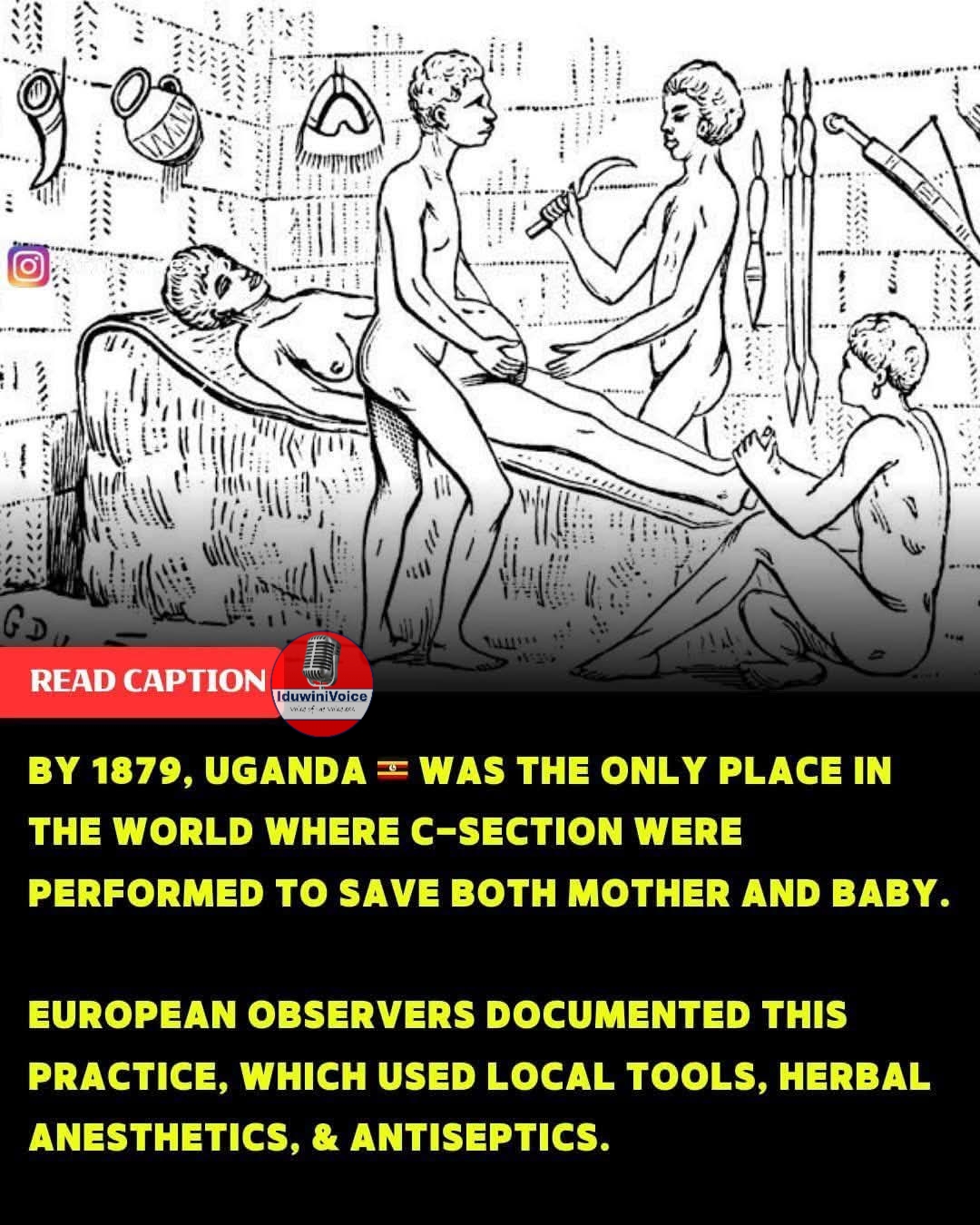
By Favour Bibaikefie
Historical medical records have revealed that indigenous surgeons in the Buganda Kingdom of present-day Uganda were successfully carrying out cesarean sections as early as 1879 — a period when the procedure was still considered highly risky in many parts of Europe.
The account was documented by British medical practitioner and explorer Robert William Felkin, who witnessed and later published details of the operation in the Edinburgh Medical Journal in 1884 under the title “Notes on Labour in Central Africa.”
According to Felkin’s observations, the procedure involved the use of banana wine as a cleansing agent, herbal preparations to manage pain, and cauterization with heated metal to control bleeding. Both mother and child reportedly survived the surgery — an outcome that drew significant attention from European medical circles at the time.
Felkin described the process as orderly and deliberate, noting that the practitioners demonstrated familiarity with anatomy, sterilization methods available to them, and post-operative care. The documentation challenged prevailing 19th-century assumptions that advanced surgical knowledge was absent in African societies before colonial contact.
Medical historians note that cesarean sections in Europe during the mid-1800s were often fatal due to infection and limited antiseptic knowledge. Antiseptic surgical techniques only became widely accepted in Europe toward the late 19th century following developments associated with figures such as Joseph Lister.
Scholars argue that the Buganda example illustrates a broader pattern of indigenous scientific knowledge that predated colonial rule. In his work, historian highlighted the complexity of African societies prior to European intervention, disputing narratives that framed the continent as lacking innovation or structured knowledge systems.
Experts say the 1879 account underscores the need for a more balanced historical perspective — one that acknowledges Africa’s contributions to medicine, technology, and empirical science long before formal Western medical institutions expanded into the continent.
The rediscovery and renewed discussion of such records continue to prompt debates about how global scientific history is written — and whose knowledge systems are recognized.
Source: African Echo
Breaking
International: Iran Confirms Death of Supreme Leader Ayatollah Ali Khamenei After US-Israeli Strikes — 40-Day National Mourning Declared
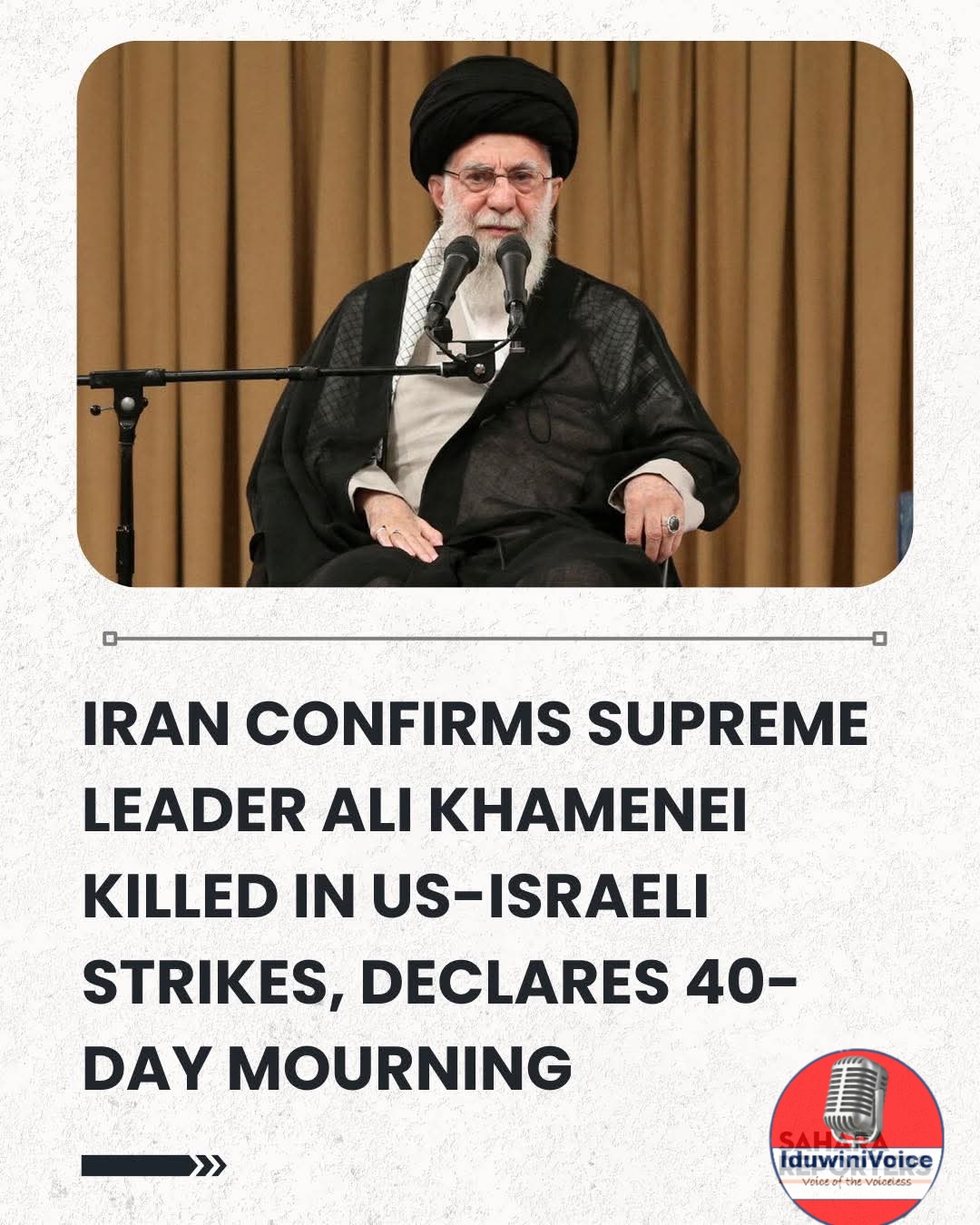
By Favour Bibaikefie, International Affairs Correspondent
Tehran — In an unprecedented escalation of Middle East tensions, Iran’s state media has confirmed that Supreme Leader Ali Khamenei has been killed following coordinated military strikes by the United States and Israel, the government announced late Saturday.
In a statement broadcast on state television, Iranian authorities declared a 40-day period of mourning and seven days of public holiday across the Islamic Republic in memory of the 86-year-old cleric, who had led Iran since 1989.
The announcement confirmed reports from earlier in the day by U.S. and Israeli officials that Khamenei had been killed during a major offensive dubbed “Operation Epic Fury” — a series of air and missile strikes targeting regime leadership and strategic sites across Iran.
President Donald Trump, in a social media post, hailed Khamenei’s death as a significant blow to the Iranian regime, describing him as one of “the most evil people in history.” Israeli Prime Minister Benjamin Netanyahu also said there were strong indications that the cleric was “no longer alive” after his compound in Tehran was hit during the attack.
Iranian state media further reported that several members of Khamenei’s immediate family, including a daughter, son-in-law and a grandchild, were killed in the same strike. Tehran’s Supreme National Security Council labelled the attack an “act of aggression” and vowed to hold the United States and Israel accountable.
The death of Iran’s supreme leader — who wielded ultimate authority over the country’s military, judiciary and all branches of government — has triggered widespread uncertainty about the future leadership of the Islamic Republic and heightened fears of broader regional conflict.
The strikes have already prompted retaliatory actions from Iranian forces, with explosions reported across several Middle East countries. International capitals are watching developments closely as responses from neighbouring states and global powers continue to unfold.
